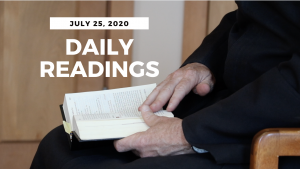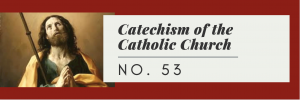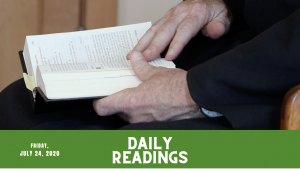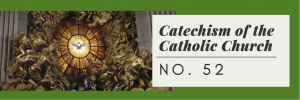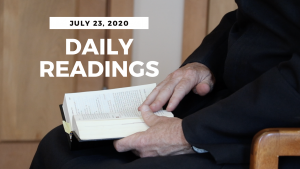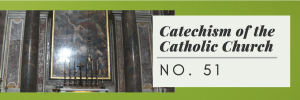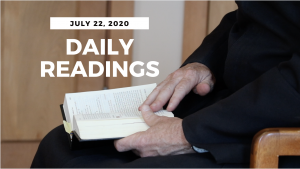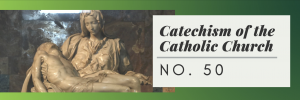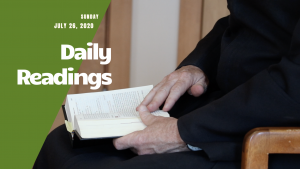
July 26 2020 Seventeenth Sunday in Ordinary Time
Reading 1 1KGS 3:5, 7-12
The LORD appeared to Solomon in a dream at night.
God said, “Ask something of me and I will give it to you.”
Solomon answered:
“O LORD, my God, you have made me, your servant, king
to succeed my father David;
but I am a mere youth, not knowing at all how to act.
I serve you in the midst of the people whom you have chosen,
a people so vast that it cannot be numbered or counted.
Give your servant, therefore, an understanding heart
to judge your people and to distinguish right from wrong.
For who is able to govern this vast people of yours?”
The LORD was pleased that Solomon made this request.
So God said to him:
“Because you have asked for this—
not for a long life for yourself,
nor for riches,
nor for the life of your enemies,
but for understanding so that you may know what is right—
I do as you requested.
I give you a heart so wise and understanding
that there has never been anyone like you up to now,
and after you there will come no one to equal you.”
Responsorial Psalm PS 119:57, 72, 76-77-, 127-128, 129-130
R. (97a) Lord, I love your commands.
I have said, O LORD, that my part
is to keep your words.
The law of your mouth is to me more precious
than thousands of gold and silver pieces.
R. Lord, I love your commands.
Let your kindness comfort me
according to your promise to your servants.
Let your compassion come to me that I may live,
for your law is my delight.
R. Lord, I love your commands.
For I love your command
more than gold, however fine.
For in all your precepts I go forward;
every false way I hate.
R. Lord, I love your commands.
Wonderful are your decrees;
therefore I observe them.
The revelation of your words sheds light,
giving understanding to the simple.
R. Lord, I love your commands.
Reading 2 ROM 8:28-30
Brothers and sisters:
We know that all things work for good for those who love God,
who are called according to his purpose.
For those he foreknew he also predestined
to be conformed to the image of his Son,
so that he might be the firstborn
among many brothers and sisters.
And those he predestined he also called;
and those he called he also justified;
and those he justified he also glorified.
Alleluia CF MT 11:25
R. Alleluia, alleluia.
Blessed are you, Father, Lord of heaven and earth;
for you have revealed to little ones the mysteries of the kingdom.
R. Alleluia, alleluia.
Gospel MT 13:44-52
Jesus said to his disciples:
“The kingdom of heaven is like a treasure buried in a field,
which a person finds and hides again,
and out of joy goes and sells all that he has and buys that field.
Again, the kingdom of heaven is like a merchant
searching for fine pearls.
When he finds a pearl of great price,
he goes and sells all that he has and buys it.
Again, the kingdom of heaven is like a net thrown into the sea,
which collects fish of every kind.
When it is full they haul it ashore
and sit down to put what is good into buckets.
What is bad they throw away.
Thus it will be at the end of the age.
The angels will go out and separate the wicked from the righteous
and throw them into the fiery furnace,
where there will be wailing and grinding of teeth.
“Do you understand all these things?”
They answered, “Yes.”
And he replied,
“Then every scribe who has been instructed in the kingdom of heaven
is like the head of a household
who brings from his storeroom both the new and the old.”
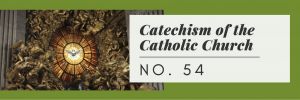
II The Stages of Revelation
In the beginning God makes himself known.
54 “God, who creates and conserves all things by his Word, provides men with constant evidence of himself in created realities. and furthermore, wishing to open up the way to heavenly salvation – he manifested himself to our first parents from the very beginning.”6 He invited them to intimate communion with himself and clothed them with resplendent grace and justice.

“For greater things you were born.” (Ven. Mother Luisita)
SUNDAY, JULY 26TH Mt. 13:44-52 “The Kingdom of heaven is like a merchant searching for fine pearls. When he finds a pearl of great price, he goes and sells all that he has and buys it.”
- Certainly as Catholics we can say the Pearl of great price is the Eucharist – the Real Presence – the Body, Blood, Soul, and Divinity of Jesus Christ!
- CCC 1324 The Eucharist is “the source and summit of the Christian life.”134 “The other sacraments, and indeed all ecclesiastical ministries and works of the apostolate, are bound up with the Eucharist and are oriented toward it. For in the blessed Eucharist is contained the whole spiritual good of the Church, namely Christ himself, our Pasch.”135.
- Now that we are able to receive Holy Communion in our outdoor Masses, let us examine ourselves on 1) How well we understand and receive Jesus in the most Holy Eucharist; and 2) How we can receive Jesus with more love and fervor.
- If we are still not able to receive Jesus sacramentally, this reflection can help us make the best Spiritual Communion of our life every day, inviting Our Lord into our heart and our life!
OUR SPIRITUAL GOLDMINE: JESUS IN OUR HEART! By Father Ed Broom, OMV
Prime time of the greatest importance in our life, without doubt, is when we have the Eucharistic Presence of Jesus in our heart. The Real Presence could not be a better descriptive term! Upon receiving the Eucharist, Holy Communion we truly have the Real Presence of Jesus in the depths of our heart, mind, and soul. Really and truly the Body, Blood, Soul, and Divinity of Jesus, the Eternal Son of God the Father, permeates, imbues and penetrates our whole being with His Real Presence.
Entering into the 35th year of my Priesthood, I am keenly aware of the sad fact that many people, after receiving Holy Communion— Jesus into their soul—all too often do not know what to do. Fumbling with their hands, picking at their fingernails, looking at their phone, staring at me, or contemplating their watch is often the attitude of many right after receiving Jesus in His Real Presence in Holy Communion.
This flippant, distracted, and bored bodily posture betrays the clear fact that many, all too many, practicing Catholics have lost belief and faith in the Real Presence of the Eucharistic Lord. Due to a diluted, overly sentimental catechesis perhaps many have never even learned what the Eucharist truly is! How else can we describe this except as a full-blown Catholic identity crisis! As Catholics, if we do not know nor believe in the Eucharist as the true Body, Blood, Soul, and Divinity of Jesus Christ then Catholics we are not!
The essential thrust and purpose of this brief essay is to help us to believe firmly in the Real Presence of Jesus in the Mass, in the Eucharist, in Holy Communion. Then consequently to strive with all the fiber of our being to receive Jesus with more faith, devotion, and love. By far, there is no greater action underneath the sun that we can do than to receive Jesus in the Holy Eucharist. However, we must receive Him with increasing faith, confidence, purity of heart, devotion, hunger and love. One Holy Communion well received could transform us into great saints.
DISPOSITIVE GRACE. The lack of fruits in the reception of Holy Communion is not due to the Sacrament we receive but due to the lack of a proper disposition in receiving the Lord of Lords and King of Kings! The better the disposition of our heart, the more abounding and copious the graces!
The following points consist of what we can do and how we should act upon receiving the most Holy Eucharist, the Real Presence—the Body, Blood, Soul, and Divinity of the Eucharistic Lord. Every Holy Communion that we receive should be received as if it were actually our first, our last, and even our only Holy Communion!
- PRAISE THE LORD! The Eucharistic Jesus is truly God. Therefore, the highest form of prayer that we can offer to God is that of praise. Unite your whole being with the angels and saints in Heaven and praise the Lord with all of your heart. As a primer, you might even recite the Divine Praises: “Blessed be God; Blessed be His Holy Name; Blessed be Jesus Christ, true God and true man; Blessed be the Name of Jesus; Blessed be His most Sacred Heart; Blessed be His most Precious Blood, Blessed be Jesus in the most Holy Sacrament of the Altar.” Beg the angels and saints to help you in your prayer of Eucharistic praise!
- THANK THE LORD. Eucharist actually means Thanksgiving. What do we have that we have not received from our Divine Benefactor, God Himself? All the good that we have in our total person is a generous and bountiful manifestation of God’s love for us. The only thing that God did not give us is our sins; we chose those! May the prayer of the Psalmist resound in the depths of our heart after Holy Communion: “Give thanks to the Lord for He is good; His love endures forever.” (Ps. 107:1)
- BEG PARDON OF THE LORD. How true Sacred Scripture: “The just man falls seven times a day.” (Prov. 24:16) Due to our many sins, we have fallen short of the glory of God in many times, places, and circumstances. With David, who committed adultery and the murder of an innocent man, with heartfelt compunction let us beg for mercy for ourselves and for the whole world, praying part of Psalm 51: “Lord have mercy on me, have mercy on me. My sin is always before my eyes. A humble and contrite heart you will not spurn. Send forth your spirit and they shall be created, and you shall renew he face of the earth.”
- BECOME BARTIMEUS THE BEGGAR. The great Saint Augustine asserted: “We are all beggars before the Lord.” Let us imitate Bartimaeus, the blind beggar, and implore the Lord to help us in our desperate need. Holy Communion is truly Jesus, the Light of the world. Beg Jesus to take the scales from your eyes so that you can contemplate His Face with ever greater clarity.
- BEG FOR OTHERS, THE GRACES THEY NEED. Our reception of Holy Communion should be Catholic—meaning universal! Saint Paul states: “The love of God compels us.” (2 Cor. 5:14) This love should be both universal and all-embracing such that we beg and pray for the many graces that so many people stand in desperate need of! Now that the Eucharistic Heart of Jesus beats in your heart, heed the words of Jesus Himself: “Ask and you will receive; seek and you will find; knock and the door will be opened to you.” (Mt.7:7)
- INTERCEDE FOR DEATH-BED SINNERS. A category of persons that often stand in desperate need of prayers are those individuals who are in their last moments, in their last and ultimate agony. By far the most important moment in our life is the moment of our death. That will determine our eternal destiny— either Heaven or Hell and forever and ever and ever! In your thanksgiving after receiving the Eucharistic Lord Jesus, who said from the cross: “Father, forgive them, for they know not what they are doing” (Lk. 23:34), beg for the conversion and salvation of deathbed sinners. Who knows how many souls will be saved by your fervent Eucharistic prayers after receiving our Eucharistic merciful Savior!
- REST ON THE SACRED HEART OF JESUS. Jesus said: “Come to me all you who find life burdensome and you will find rest for your souls; for my yoke is easy and my burden light.” (Mt. 11:28-30) After receiving Holy Communion, you can imitate Saint John the Evangelist, the Best Friend of Jesus, and simply rest lovingly and peacefully on His Sacred Heart—the best resting place!
- CAST YOUR CARES UPON THE LORD… Saint Peter expresses a very important human sentiment and situation that we all experience during the course of our life, every week and perhaps even every day— problems, worries, anxieties, and confusion. Saint Peter’s Letter expresses this state of soul in this short but clear concept: “Cast your cares upon the Lord because He cares for you.” (1Pt 5:7) As the Eucharistic Heart of Jesus beats in your heart, He will come to help you with your worries, to either remove them or at least to help you carry your present crosses! Jesus is the Best Friend who will never fail us!
- BEG FOR A HEART-TRANSPLANT! Our heart, mind, soul, and body can be compared to a Garden. Amidst the roses, tulips, and daffodils flourish the ugly but all too-prevalent weeds! If the weeds are given permission to grow, flourish, and spread, then in a matter of time they will suffocate the beautiful flowers! The Garden analogy applies to virtues and sins. The flowers are the virtues; the weeds are the sins. If not uprooted, the vices dominate in our lives and sin reigns! Upon reception of Holy Communion, we should beg the Lord Jesus to uproot and exterminate the weeds, so that the flowers of virtues can flourish and blossom. May the Eucharistic Heart of Jesus transplant our hearts and make us saints!
- OUR LADY OF THE EUCHARIST AND THANKSGIVING. Finally, beg the Immaculate Heart of Mary to speak to the Heart of Jesus to praise Him, to love Him, to worship Him on your behalf. Saint Louis de Montfort suggests praying Mary’s Canticle of Praise, the Magnificat, in your thanksgiving to the Eucharistic Heart of Jesus beating in the depths of your soul. May Mary’s words echo in your heart after you receive Jesus in Holy Communion: “My soul proclaims the greatness of the Lord and my spirit rejoices in God my Savior.” (Lk. 1:46-55)
In conclusion, the most important gesture and moment in our life is when we receive the Eucharistic Jesus in the depths of our heart and our soul in Holy Communion. Then the moments, the minutes after Holy Communion must be the most precious moments in our whole human existence. Let us strive with all the fiber of our being to prepare properly to receive the Eucharist, but also strive to improve our Thanksgiving after the reception of Holy Communion. Our sanctification, our growth in grace, our growth in virtue and overcoming vice, and our final perseverance can truly depend on the manner in which we treat the Lord Jesus right after receiving Him in Holy Communion. May Our Lady of the Eucharist, and of the angels and saints come to our help!
Copyright 2020 Oblates of the Virgin Mary
